 Biotechnology Research Viewed With Caution Globally, but Most Support Gene Editing for Babies To Treat Disease | Pew Research Center
Biotechnology Research Viewed With Caution Globally, but Most Support Gene Editing for Babies To Treat Disease | Pew Research Center
The results of the latest Pew Research international survey reported recently explore the public perception of science, how it conflicts with religion if at all, and how much this influences people's perception of the appropriateness or otherwise of gene editing techniques on human babies.
The results vary considerably by nation and especially by the predominant religion in that nation. Significantly though, almost all religious groups in almost all countries register 50% or more who accept evolution. It thus measures to what extent the scientific account has replaced the creationist view of the origin of species and particularly of humans, which predominated until Darwin and Wallace published the idea of a natural force - evolution by natural selection - as being responsible for the origin of species and of biological diversification.
Majorities say humans have evolved over time; Christians often less likely to express this view
The only exceptions are Muslims in Singapore at 38% and both Muslims and Christians in Malaysia (39% and 40%, respectively). In almost every country where there are significant number of people not affiliated to any religion, acceptance of evolution in this group is usually well over 70% and normally in the high 80's.
In the USA, Christians are amongst the lowest of Christian groups at 54%, only a little better than Brazil (51%), South Korea (50%) and, as reported earlier, Malaysia (40%). Hindus, Taoist and Buddhists were all above 50%. Russian Muslims were 53%. Interestingly, American Christian acceptance of evolution is more typical of Muslim groups than of most other nation's Christian and other religious groups. | 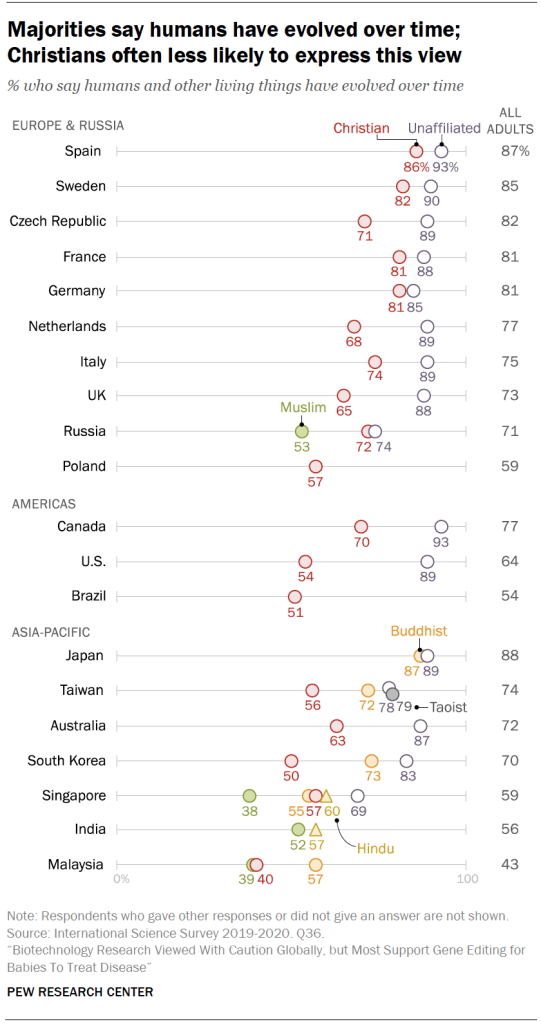 |
Majorities in most of these publics say humans and other life has evolved
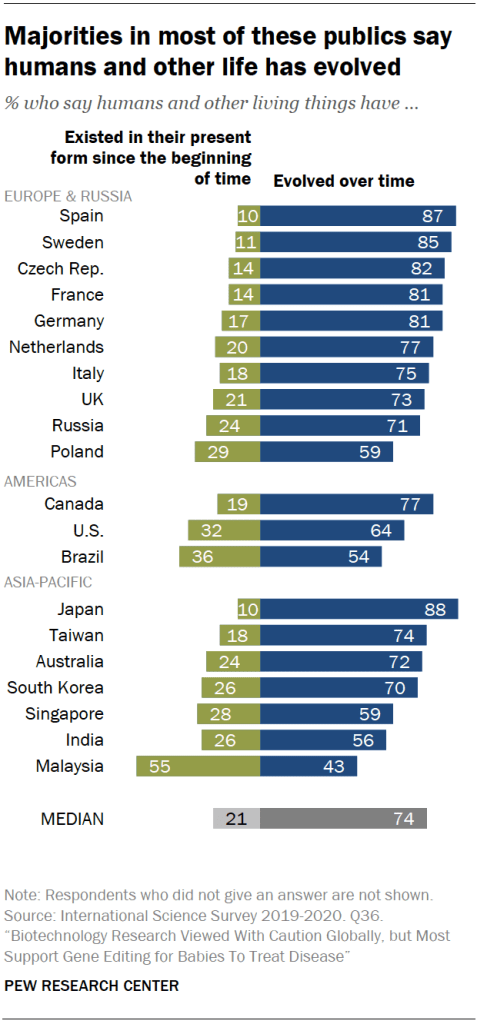 | Averaged out and weighted for populations sizes of the religious and non-affiliated groups, once devoutly Catholic Spain came top in their acceptance of evolution at 87% of all adults, followed unsurprisingly by the predominantly Atheist countries of Sweden (85%) and Czech Republic (82%). The 'Catholic' countries of France and Italy were above 70%. In fact, the only country surveyed to be below 50% was Malaysia at 43%.
In the USA, the percentage of those who now accept that humans have evolved over time has risen to 64% with less than one-third of adults now believing humans were created as they are today and have since remained unchanged. |
More religious adults less approving of gene editing to treat disease in babies
Perhaps not surprisingly for those who appear to get their understanding of science from holy books and preachers, rather than from learning even basic science, the same survey revealed that the more religious a person is (measured by how important they said religion was in their lives) the less likely they were to support the use of gene editing to treat a serious condition that a baby might have at birth.
Although the reasons for thinking this were not explored, it seems that the more religious are content to allow a child to suffer from serious handicaps or medical conditions than to interfere with what they believe their god created. Supersittion and the fear of annoying a deity, or some strange belief that a suffering child is for some ultimate good purpose, seems more important than preventing suffering in others, even when this is technically possible.
Even so, the overall approval figures, including those for whom religion was 'not too/not at all important', in all the countries surveys was well over 60% in favour of genetic intervention to treat serious conditions. This is broadly in line with the percentage of those who accept evolution as the best explanation for human existence. | 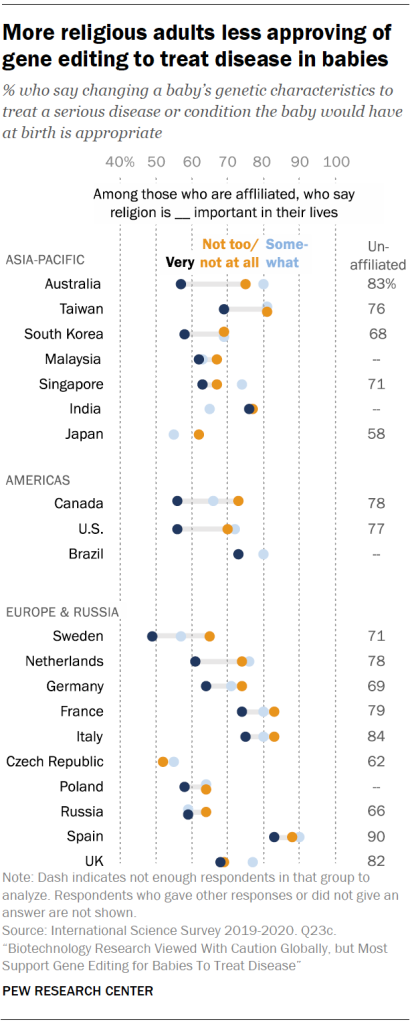 |
Many across global publics are wary of gene-editing research, but majorities have a favorable view if gene editing for babies is used to treat serious disease
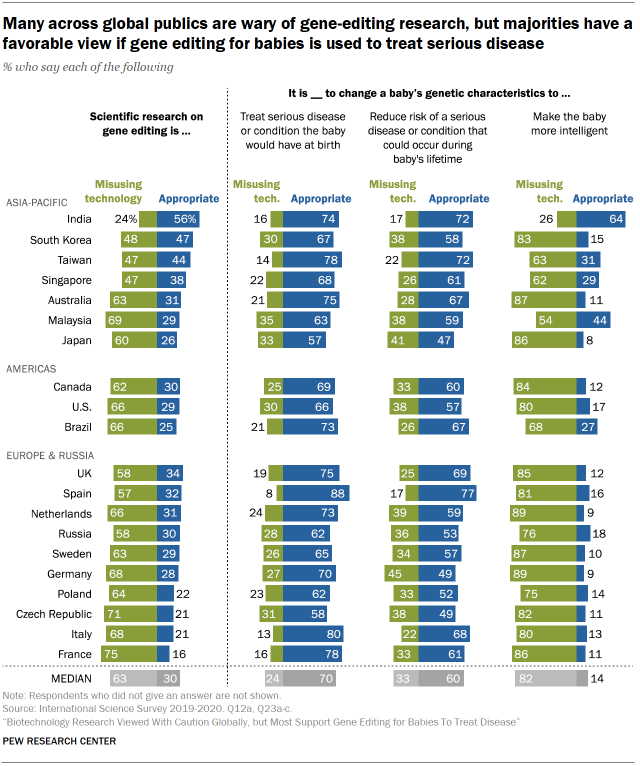 | Although there is a general, widespread belief that gene editing is a misuse of technology, this does not extend to all possible uses. For example, using it to treat or reduce the risk of serious diseases or conditions in babies is seen as appropriate, there is a large majority across all groups who see using it to improve a baby's intelligence as a misuse. |
Half or more in most publics say there is a general conflict between science and religion
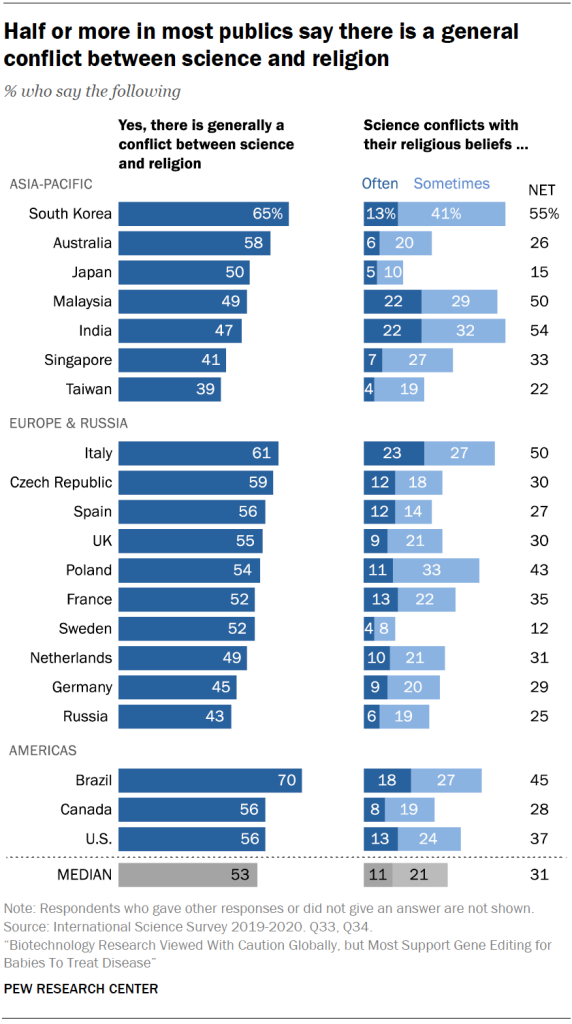 | There is generally a mixed perception of the degree to which science and religion are in conflict. For example, in south Korea, where 65% see a conflict existing and 55% feel this conflict between science and their religion sometimes or often, in Australia these figures are 58% and 28% respectively, and in Japan; 50% and 15% respectively.
These differences are probably related to the numbers of religious versus unaffiliated people in different countries. For example, although I, as an Atheist see science as a counter to religious superstition and therefore in conflict with it, I would say that science never conflicts with my 'religious' beliefs (i.e. no religious beliefs at all, therefore no conflict).
Creationist fundamentalist, on the other hand, with their belief in a literal interpretation of their holy book, have religious belief that are in direct conflict with scientific explanation of not just the origin of humans but of all life, Earth and of the Universe itself. Not only is this conflict recognised but it is felt often, whenever they hear a scientific explanation for almost anything. |
It is clear from this survey that, in the countries surveyed, science has made huge inroads into religious belief and has largely replaced religious superstition as the best explanation for biodiversity and human origins. Nevertheless, there is widespread concern about the ethics of using gene-editing either therapeutically to correct genetic abnormalities which could or will cause a child problems in later life. Howver, using it to 'interfere with nature' (an essentially religious view as though there is some intent behind a baby's genetics) is considered an inappropriate use of the science.

 Biotechnology Research Viewed With Caution Globally, but Most Support Gene Editing for Babies To Treat Disease | Pew Research Center
Biotechnology Research Viewed With Caution Globally, but Most Support Gene Editing for Babies To Treat Disease | Pew Research Center





No comments:
Post a Comment
Obscene, threatening or obnoxious messages, preaching, abuse and spam will be removed, as will anything by known Internet trolls and stalkers, by known sock-puppet accounts and anything not connected with the post,
A claim made without evidence can be dismissed without evidence. Remember: your opinion is not an established fact unless corroborated.